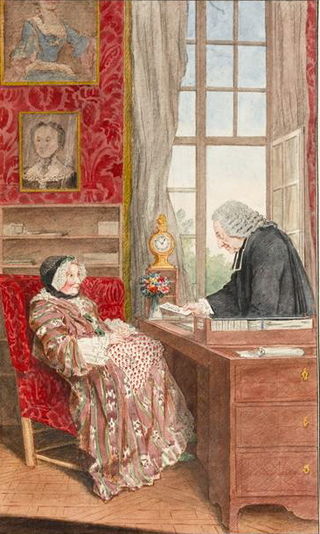
Lettres de cachet were letters signed by the king of France, countersigned by one of his ministers, and closed with the royal seal. They contained orders directly from the king, often to enforce actions and judgments that could not be appealed.

The Bastille was a fortress in Paris, known as the Bastille Saint-Antoine. It played an important role in the internal conflicts of France and for most of its history was used as a state prison by the kings of France. It was stormed by a crowd on 14 July 1789, in the French Revolution, becoming an important symbol for the French Republican movement. It was later demolished and replaced by the Place de la Bastille.

Victor de Riqueti, Marquis de Mirabeau was a French economist of the Physiocratic school. He was the father of Honoré, Comte de Mirabeau and André Boniface Louis Riqueti de Mirabeau. He was, in distinction, often referred to as the elder Mirabeau as he had a younger brother, Jean-Antoine Riqueti de Mirabeau (1717–1794).

Roland Émile Mousnier was a French historian of the early modern period in France and of the comparative studies of different civilizations.

Simon-Nicholas Henri Linguet was a French journalist and advocate known for his conservative politics who was executed during the French Revolution.
Marie-Jeanne Riccoboni, whose maiden name was Laboras de Mézières, was a French actress and novelist.

Marc Fumaroli was a French historian and essayist who was widely respected as an advocate for French literature and culture. While born in Marseille, Fumaroli grew up in the Moroccan city of Fez, and served in the French army during the Algerian War.

Marie Anne Doublet, known as Doublet de Persan, Legendre, was a French scholar, writer and salonnière. She was born and died in Paris.

Henri Cordier was a French linguist, historian, ethnographer, author, editor and Orientalist. He was President of the Société de Géographie in Paris. Cordier was a prominent figure in the development of East Asian and Central Asian scholarship in Europe in the late 19th and early 20th century. Though he had little actual knowledge of the Chinese language, Cordier had a particularly strong impact on the development of Chinese scholarship, and was a mentor of the noted French sinologist Édouard Chavannes.
Magdelaine Chapelain was a French fortune teller and poisoner. She was a defendant in the famous Affair of the Poisons.

Charles Joret was a French literary historian, philologist and botanical author. His name is associated with the so-called ligne Joret, a locative boundary used in the linguistics (isogloss) of the Langues d'oïl.
Jean-Charles Darmon is a French literary critic born in 1961.

Jean-Yves Mollier is a French contemporary history teacher.
Geneviève Hasenohr is a French philologist and prolific scholar of medieval and Renaissance French literature. She has authored or contributed to more than forty books, written at least fifty academic articles and reviews, and prepared numerous scholarly editions.
Robert Muchembled is a French historian. In 1967, he passed the Agrégation in history. In 1985 he was awarded a doctorate for his thesis on attitudes to violence and society in Artois between 1440 and 1600. In 1986 he became Professor of Modern History at Paris 13 University. He has written notably about witchcraft, violence and sexuality. Some of his works have been translated into English, German, Spanish, Italian, German, Dutch, Croatian, Modern Greek, Turkish, Chinese, Japanese, Polish and Portuguese.
Marc Venard was a French historian.
Sabine Chaouche is a scholar who specializes in the history of theatre, intellectual history, social and economic history.
Christine Nougaret, née Christine Françoise Marguerite Chapalain, is a French archivist and historian.

Claude-Hélène Perrot was a French historian and Africanist who specialized in the history of Côte d'Ivoire. She served as a professor of contemporary African history at the Paris 1 Panthéon-Sorbonne University from 1983 to 1993. Perrot's main areas of research concerned the history of the Akan of Côte d'Ivoire and Ghana before colonization, mainly the Anyi and the Eotile; the use of oral tradition by historians; as well as relations between traditional African religions and political power. She was honored as Commander, Order of Ivory Merit.

Marie-Madeleine Bonafon, sometimes referred to as Marie-Madeleine Bonafous d'Albert, was a French novelist imprisoned for her novel Tanastés (1745), a roman à clef of the sex life of King Louis XV of France.












